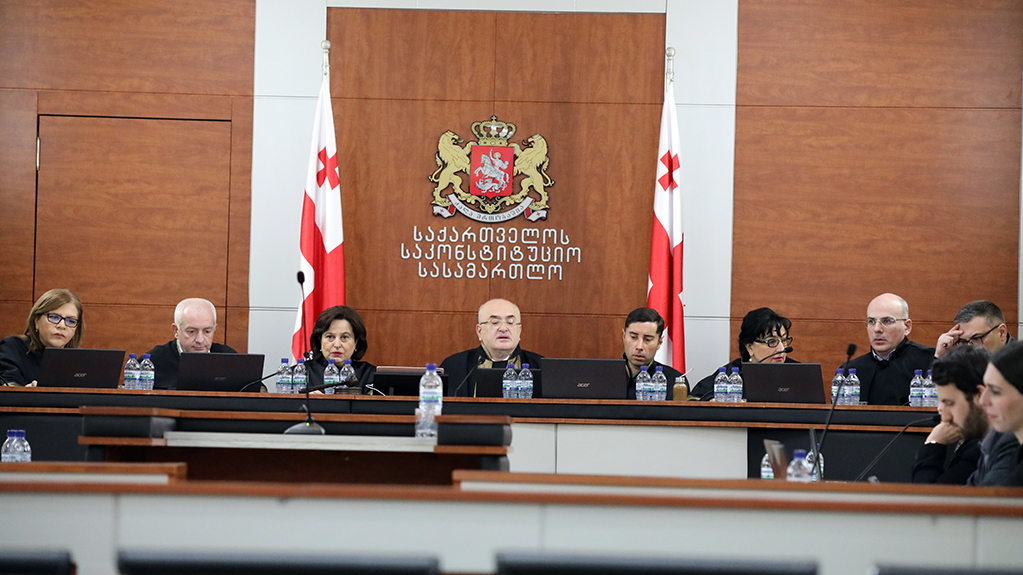The Constitutional Court of Georgia has declined to substantively consider the constitutional complaints filed by the President of Georgia and opposition members of the 10th Parliament regarding the annulment of the results of the October 26 parliamentary elections.
News
The Constitutional Court held a plenary session without an oral hearing on November 28 and 29, and the ruling, which is final and not subject to appeal or review, was published today, December 3.
The Constitutional Court determined that the claims were insufficiently substantiated to warrant consideration on the merits. Regarding the alleged violation of the secrecy of the vote during the electoral process, the Court noted that none of the contested norms imply that deviations from the secrecy of the vote are permissible or that the selection of a ballot or marker could, in any way, make a voter's choice perceptible from both sides of the ballot.
“According to the plaintiff, during the 2024 parliamentary elections, the ballot paper and marker used at technologically equipped precincts were selected in such a way that, after the voter marked the circle corresponding to a candidate, the colored area was visible from both the front and back of the ballot paper. The plaintiff argued that this allowed a person standing near the ballot box to discern the voter's choice to some extent when the ballot was inserted into the machine. While it may not have been possible to identify the exact candidate voted for, it was allegedly possible to determine whether the voter supported the ruling party, the opposition, or any political entity in general.
To substantiate the unconstitutionality of the disputed norms, the plaintiff is required to demonstrate that the identified issue originates from the norms themselves, is a direct result of their implementation, and not due to the behavior of the election administration. Specifically, the plaintiff must prove that the disputed norms mandated the creation and use of the ballot and/or marker in the manner described, that it was impossible to conduct an orderly vote while maintaining secrecy under these norms, or that there were circumstances indicating that proper conduct by the election administration would still result in a violation of voting secrecy under these norms. Since the constitutional claims lack any arguments indicating that the issue arises from the norms themselves with regard to voting secrecy, it is evident that the plaintiff's identified problem pertains to the election administration's actions (selection of the ballot paper and/or marker) and not the content of the norms in question.
The plaintiff claims that the norms establishing the procedure are unconstitutional, but the constitutional claims fail to demonstrate that these norms permit any deviation from voting secrecy or establish a process that inherently violates it. Therefore, it is clear that the plaintiff is not challenging a violation caused by the disputed norms but rather the improper selection of the ballot paper and marker by the Central Election Commission (CEC). The evaluation of the constitutionality of this act falls outside the scope of assessing the constitutionality of the norms themselves,” the Court stated.
The plaintiff also argued that the Central Election Commission (CEC) failed to ensure the opening of polling stations abroad near the residences of Georgian citizens, thereby making it inaccessible for them to participate in the elections. Additionally, the plaintiff pointed to the alleged discrimination against Georgian citizens living abroad, compared to those for whom polling stations were opened near their residences.
“Participation in elections by citizens is inherently associated with meeting certain requirements; citizens must naturally go to polling stations, possess a valid ID card, undergo marking, and so forth. Accordingly, the fulfillment of certain requirements to vote is inevitable and, in some cases, a necessary prerequisite to ensuring fair elections. Thus, the establishment of certain barriers to participation, such as the non-opening of a polling station in a specific location, does not, in itself, constitute a violation of the right to vote. A violation of this right could occur if it were established that the state, with reasonable resources, had the opportunity to provide broader electoral coverage abroad, including opening polling stations in additional locations, while ensuring proper election organization, but failed to do so. This particular aspect should have been adequately substantiated in the constitutional claim.
The plaintiff’s argument regarding discrimination among Georgian citizens is also unfounded. Naturally, it is impossible to provide the same level of accessibility to polling stations abroad as in Georgia. For example, the combined territories of the European Union and the United States are approximately two hundred times larger than Georgia. Even if 3000 polling stations were opened abroad, the average distance to a polling station for citizens would still be at least two hundred times greater than in Georgia. Therefore, in terms of territorial accessibility, citizens living inside and outside Georgia are not comparable. Within reasonable limits, it is impractical to require the state to ensure the same level of accessibility to the electoral process abroad as within Georgia, particularly regarding the distance from the place of residence to the polling station.
This example clearly demonstrates that it is impossible to open polling stations abroad in such a way that the distance between them is not several hundred kilometers. Consequently, the substantial difference in distances between residences and polling stations for Georgian citizens living abroad is inevitable. Thus, the plaintiff’s claim of discrimination among citizens does not relate to the objectives of the disputed norms or the results of their application. In cases where elections are conducted in accordance with the methods established by the Election Code of Georgia, the existence of significantly different levels of access for citizens to participate in elections is practically unavoidable,” the ruling states.
The ruling was adopted by members of the Plenum: Merab Turava, Eva Gotsiridze, Giorgi Tevdorashvili, Irine Imerlishvili, Khvicha Kikilashvili, Manana Kobakhidze, and Vasil Roinishvili. It is accompanied by a dissenting opinion from two judges, Giorgi Kverenchkhiladze and Teimuraz Tughushi.















